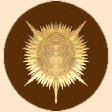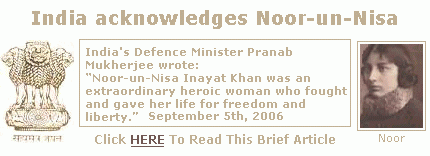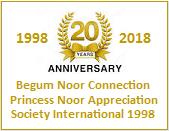



|
Noor-un-nisa Inayat Khan, highly decorated war heroine, was the great-great-great-grandaughter of Tipu Sultan,
'The tiger of Mysore', last Moghul emperor of Southern India;
the story of her antecedents is this. In the eighteenth century, a weak and internally disrupting Hindu dynasty, in the state of Mysore, found itself briefly displaced by a Muslim rule. If the star of this Muslim dynasty burned for only a short time, yet it was with a bright light. The two rulers, a father, and after him a son, left names which are still meaningful in history - less happily resonant in England than elsewhere, since it was their warfare against the British that they were mainly distinguished. Haidar Ali Khan (1722-82), a warrior chieftain who, in 1761, usurped the supreme power, was a man of able brain and vigorous temperament. The Hindu in Mysore had been a quiet neighbour to the East India Company, politically and militarily somewhat negligible. The usurpation of Haidar brought into being, quickly, a very different situation. By a historical process which it is not the purpose of this book to examine, Haidar and the British came long to be engaged in armed hostilities. (Haidar had at his back some support from the French). At first the advantage was with Haidar. In 1780, he swept through the carnatic with 20,000 men, scoring over Colonels Braithwaite and Baillie victories so annihilating as to imperil the existence of the East India Company. Subsequently the British recuperated, stood, and after about a year's defensive warfare, advanced under Sir Eyre Coote, and secured two signal victories over Haidar, at Porto Novo, on the Madras coast, and at Pollilore. Haidar always felt that the sea had been his worst enemy. "The defeat of my many Braithwaites and Baillies will not destroy them," he said on his death-bed. "I can ruin their resources by land, but I cannot dry up the sea." So saying, he bequeathed the conduct of the war to Tipu, his son, and died. Tipu Sultan (1749-99) was a genius rather different in nature from his father. Whereas, according to the British, Haidar's attitude was frankly secular, and he cared not at all what a man's religion might be, so long as he were a good soldier, Tipu was before everything, devout. It has, however been claimed that Haidar was of the Sunni or Orthodox Islamic faith, in which case the difference between them may rather have been that where his religion was of the conventional order, Tipu was a mystic, with a mystic's fervour. Traces of the Sh'ite, intensely individualistic, thinking (or to the Sunnis, heresy) are evident in many of his pronouncements; he regarded himself as a defender of the faith. More especially, he believed himself to be inspired by the direct tutelage of Ali, the son-in-law of Mohammed. His mother, Fakhr-un-nisa, the beautiful and pious sister of Abdul-ul-Hakim, the Nawab of Kalapa, had been, on the eve of his birth, to visit the ascetic, Tipu Mastan Aulia, to ask for his blessing on her first-born, and some indication concerning his future. That he ascribed some spiritual character to the child appears in that he told the Begum Fakhr-un-nisa she should give it his own name. Concerning the origin of the name Tipu, there is some controversy, but on the grounds other than linguistic, the thesis which would make it a deviation from the Kanarese word for 'tiger' recommends itself. From the first, Tipu took this beast as his personal symbol, and upon his accession to the throne in 1782, he made it the official emblem of the state of Mysore. The tiger's head figured as his armorial bearing, and the word 'sher' (tiger) or it's initial letter, appeared stamped, embroidered or engraved upon every article of his use. Throughout India, he was known as 'The Tiger of Mysore'. Even the stripes upon his clothing, and upon the upholstery of his throne and the cushions of his chamber, represented the stripes of the tiger. His throne had eight corners, surmounted by eight tiger heads, and the whole was set as though across the back of a tiger, whose huge gold head projected in front. Live tigers upon chains guarded the great doors of his palace on the fortified island of Seringapatam, and inside the palace more tigers were kept, some in cages, and some upon chains - and it is said that two of his ministers, having incurred his gross displeasure, were thrown to them alive. The proud words for which he was best known were, 'Better two days as a tiger, than two hundred years as a sheep' Tipu Sultan inherited the war with England in an hour when it was going badly. He was unable ever to make up his father's losses, and in 1792, the eleventh year of his reign, he was obliged to sign a treaty with Britain by which he lost nearly half his dominions. He signed with a bad will, and never ceased to scheme for their recovery. His dearest ambition, however, was not merely the restoration of the former boundaries of the Sultanate, but nothing less than the total expulsion of the British from India. For its accomplishment, he knew that he must be dependant upon a French alliance, and he was content to bide his time. His first embassy to France, in 1778, had been dissapointing in its results. His delegates had been, indeed, courteously and lavishly entertained by the king, Louis XVI, but had returned without concrete guarantees. Under the growing shadow of popular discontent, Louis hesitated, understandably, in sending to Tipu, arms and supplies which he might need at home. The French Revolution coming in the same year that Tipu lost half his dominions, was a source of peculiar embarrassment to the Sultan. A monarch himself, profoundly convinced of the divine consecration, inspiration and right of kings, he could not feel sympathy toward a popular government which had arrived by the decapitation of the consecrated head. Nevertheless, France and Mysore were natural allies. He did nothing precipitate. A little time passed. The Republic, when it took time to considering affairs in the East, expressed itself desirous of maintaining those relations of amity which had always obtained between France and Mysore. Tipu broached the question of a supply of men and arms. Gradually both began to find their way into the Sultanate. On May 14, 1797, the Tricolor was formally hoisted in the city of Mysore, and Fracois Ripaud proposed a toast to 'Citizen Tipu !" The presence of French troops on his soil, though very welcome, was not entirely without embarassment to the Sultan. A devout observer of the prescriptions of the Koran, he had early in his reign issued an edict forbidding the sale and consumption of spirituous liquors in his dominions, and had followed this up by sending his officials out to require from every previous distiller or vendor an engagement to turn to another occupation. To a minister who had represented to him the loss of revenue which must be consequent, he had retorted that 'a king should be inflexible in his orders, and God had forbidden the use of wine'. It was not until the news of Lord Nelson's victory in the Nile reached Calcutta on October 31st, that the Governor-General felt in a position strong enough to reveal to Tipu his knowledge of his relations with the French and evident intent to violate the terms of his treaty of 1792. On February 3rd, 1799, the Governor-General signified that he now considered England to be at war with Tipu Sultan. In March, Colonel Wellesley was apponted to the command of the British forces serving wioth the Nizam of Hyderabad; and in the same month, the army marched. After some manoeuvres and skirmishing, the Sultan found himself obliged to a defensive action, and fell back upon his island fortress of Seringapatam, in the Cauvery river, a few miles to the north of the city of Mysore. On the evening of May 3rd, British guns breached the ramparts, and at half past one on the following afternoon, General Baird led the forward storming party. The fighting was fierce. The Sultan himself stood with those who were attempting to hold the breach, firing with his own hand. When it became evident they could not stem the invasion, he turned abruptly, and attempted to force his way through the press on horseback, toward the Zenana. According to Rajah Khan, the only person to have been at his side the whole afternoon, the thought of the ladies of the household had been in his mind since the moment when he realised the fort was going to fall, and he had considered it his duty to put them to the sword with his own hand, lest they be exposed to outrage in the tumult. The great gateway, when the Sultan and Rajah Khan reached it, presented already a scene of carnage. Trying to push his way through a melee, in which British soldiers and his own were closely mingled, the Sultan was wounded, first in his breast, then in his right side. Rajah Khan, seeing how heavily he was afflicted, cried out to him that he should make his identity known to the British soldiers, who would surely treat his person with respect. "Are you mad?" shouted Tipu. "Be silent!" Rajah Khan attempted to disengage him from the saddle and they both fell to the earth together. Rajah Khan, wounded in the leg himself, was yet able to drag the Sultan a little to one side, and so prop him up under the relative shelter of a the arch of the great gate. An English soldier, catching sight of the rich gold buckle with which the Sultan's belt was fastened, stooped and tried to take it off him. Tipu, however, was not dead yet. So many bodies had fallen across his own that he could not get to his feet, being pinned amongst the dead and dying; but he reached out with his hand, laterally, plucked a sword from one of those who had fallen, and struck upwards, slashing the grenadier across the knee. The grenadier, incensed, raised his musket, put it straight to the Sultan's temple, not knowing who he was, and shot him. Even in death, wrote one present, he carried such a vivacity of hatred that Arthur Wellesley, standing over him in the flickering torchlight, could not believe him dead till he had felt the heart and pulse. He was dressed in a white linen jacket, and loose drawers of flowered chintz, with a crimson cloth of silk and cotton round the waist. He was of small stature, a trifle corpulent, very dark of complexion, with aqualine nose, bold eyes and prominent chin. His brows were finely arched, and his hands and feet remarkably small and delicately shaped. The following day, four companies of Europeans marched with his bier. It was borne by his personal attendants, and accompanied by the Kazi, chanting verses from the Koran. Thousands of the faithful prostrated themselves as the Sultan passed on his last journey through the streets toward Lal Bang, where they laid him with his father; the occasion of the last obsequies being rendered more awful by the bursting of an almighty thunderstorm. |










Visit Jean Overton Fuller Homepage
PRINCESS NOOR APPRECIATION SOCIETY INTERNATIONAL
RETURN TO HOMEPAGE - Daughter of Sufism - Noor-un-nisa Inayat Khan






